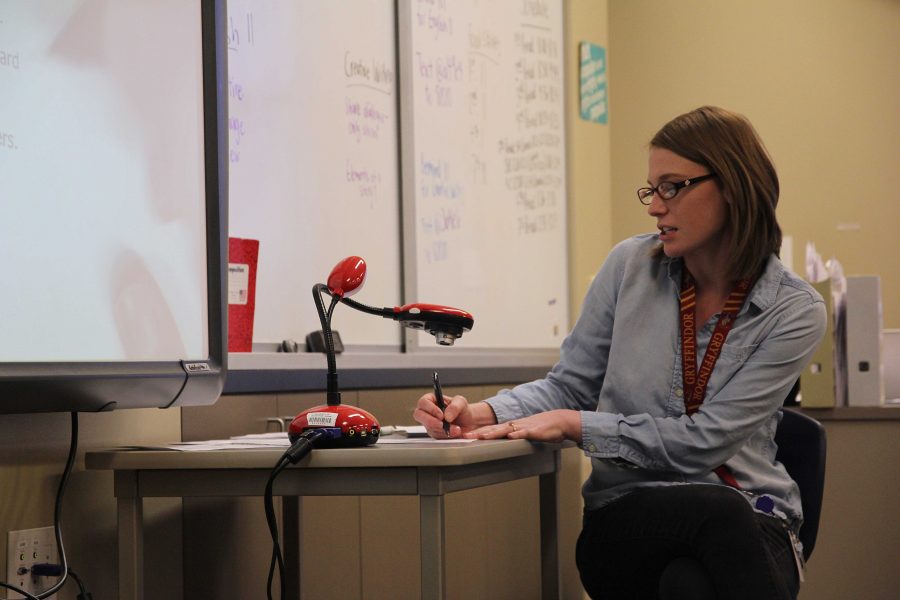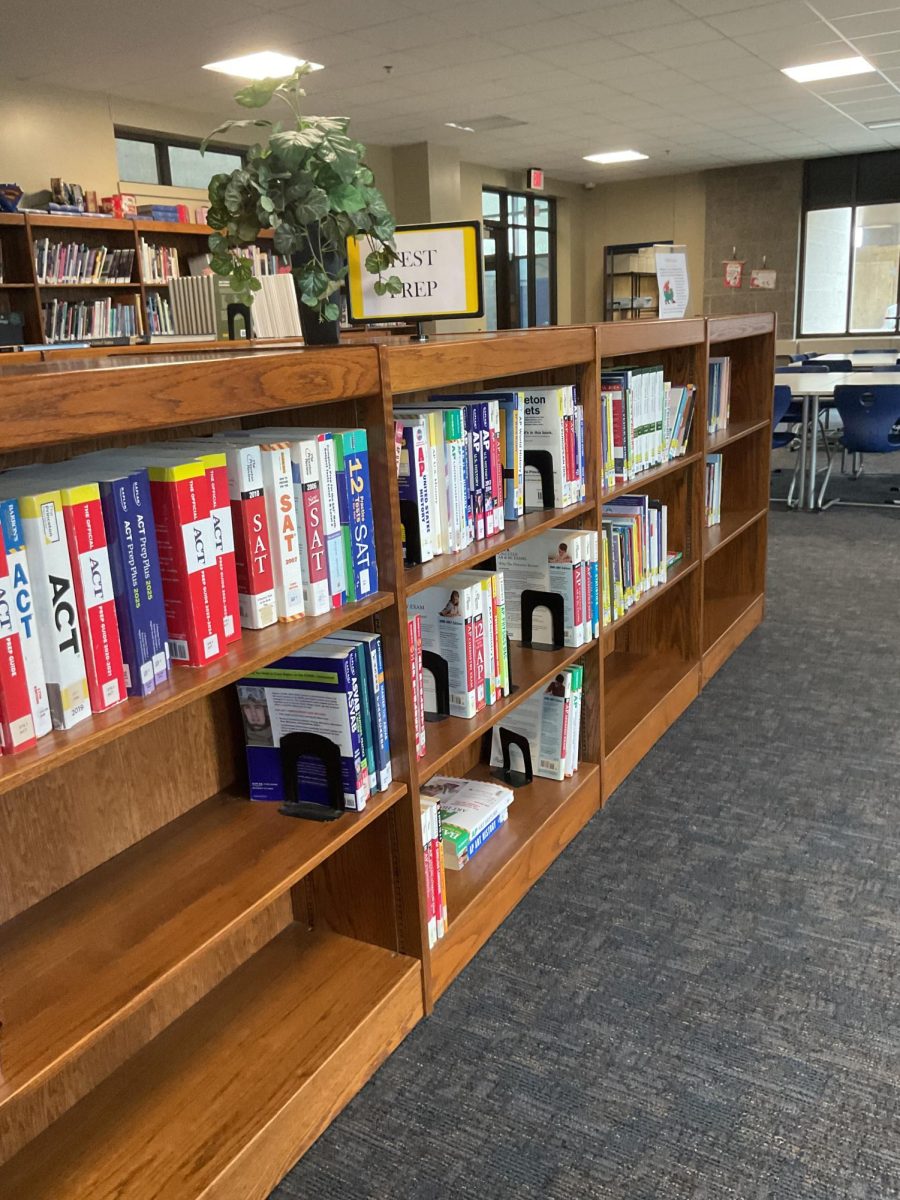Romanticism Assignment Controversy
English teacher Caroline Walton instructs her fourth period.
February 16, 2017
A research assignment over romanticism became heavily criticized, as conservative radio host Doc Washburn questioned if the project assigned by English teacher Caroline Walton was indoctrinating students.
The radio host for Little Rock’s 102.9FM station, who describes himself on his website as “a proud southerner, a conservative and a recovering DJ,” received pictures of an assignment Walton assigned to her 11th grade English class, which tasked students to research groups in modern day America that represent a cause or movement that students do not personally identify with.Washburn challenged that the assignment was “indoctrinating” students and had no real ties to Romanticism, which was the period of literature Walton was introducing at the time.
“Romanticism is rooted in revolt and in challenging the status quo and is about [achieving] individuality,” Walton said. “My thought for this lesson was that I wanted a way to make it relevant. A lot of times students complain about not seeing the relevance in what they are learning, so I saw an opportunity with [the idea of] challenging society and government. Right now in our country, there is a lot of that going on.”
Walton gathered a list of groups in America that are protesting for representation and reform in America, and tasked students to pick one group and research and answer questions over that movement.
If students did not want to cover any of the groups Walton had listed, they could choose their own group to research, as long as it met certain criteria.
“I said I was open to any students who wanted to cover a different group,” Walton said. “I had some students do groups [like] Westboro Baptist Church. The requirement was that [the group] had to interact with the government in some way. Another requirement is that it had to be a cause that didn’t affect you directly. My intention from that was so they could learn about something other than themselves so they could grow as people.”
Washburn posted pictures of the assignment on his Facebook page, as well as a screenshot from Walton’s Facebook page that displayed her engagement to her female partner. He accompanied these pictures with his own comment.
“11th grade students at Bryant High School were assigned a ‘research project’ which has nothing to do with English Lit or the Romantic Period and everything to do with the liberal female teacher (who is ‘engaged’ to another woman) seeking to indoctrinate him,” Washburn wrote in a Facebook post.
Washburn failed to respond to a request for further comments.
Several commenters claimed that Walton should be fired, writing that her sexuality disqualified her from being a teacher. Walton was not contacted by Washburn for comment, and she heard that she was the topic of conversation on the radio show from a student who alerted her after school. After hearing reactions from Washburn and his listeners, Walton was fearful of her job security heading back into the classroom.
“I came to school [the next] Monday morning not knowing if I was going to have a job or not,” Walton said. “The administration were all very reassuring and came in before class to check on me, and that meant a lot. Several other teachers voiced their support, like Mrs. [Lisa] Stine, Mrs. [Melissa] Anderson [and] Ms. [Dawn] Higgs.”
Higgs, the high school literacy specialist, visited Walton not only to check on her emotionally, but also to reaffirm the legitimacy of her lesson. Higgs believes Walton’s lesson was designed to train the argumentative skills of her students.
“I went by [her class] to let her know that I understood the intent of the lesson and that I thought it was appropriate for her class,” Higgs said. “In the media today, you see very few examples of effective argumentation. In order to craft an effective argument, you have to define who your audience is and what they value. If you aren’t acknowledging the opposing viewpoint, you are not going to convince anybody.”
Higgs believes that people on both sides of the political spectrum are guilty of weak argumentation, but thinks that beliefs must be communicated effectively to create meaningful discussion.
“If you are passionate about something, I want to teach you how to argue that effectively,” Higgs said. “You don’t have to change your mind, but at least appreciate the viewpoint of the opposition so you can make a logical and respectful argument. We aren’t trying to indoctrinate the kids. We want them to think for themselves.”
“My intention was for the students to read about [these groups] and to answer research questions about what the group or movement was about,” Walton said. “It was not my intention to tell my students how to think about these issues, because I have students who take all kinds of different sides. It was just my intention to have them think about [the issues] at all.”





Matthew Washburn | Sep 26, 2018 at 5:28 pm
Wow. I know I’m over a year late on this but just wow. I don’t really follow my father’s career too heavily, but this is just sickening to see that he did.
ceecee | Feb 20, 2017 at 6:08 pm
Think I see Washburn’s real problem. It’s in the paragraph above that begins “11th grade students at Bryant High School….”.
Washburn only wants students to look at one side of an issue. Seriously? That’s NOT how critical thinkers are created.
Kudos to this teacher for a good assignment! Why not leave school assignments up to the professionals, “Doc”?
Maureen T Maher | Feb 20, 2017 at 3:22 pm
What a great way to make Romanticism relevant! KUDOS
Anne Lutz Fernandez | Feb 20, 2017 at 3:14 pm
As an English teacher in Connecticut who has interviewed teachers across the US in a variety of settings, I recognize how fortunate this school and its students are to have a teacher such as Ms. Walton. The project has all the hallmarks of great teaching, and it absolutely has everything to do with American Romanticism and the ideas of writers such as Emerson and Thoreau. I also can’t help but recognize how difficult it is for teachers to hold onto their pedagogical values in our relentlessly political environment. Fear of personal attacks and accusations of political motivation can discourage too many teachers from creating assignments such as this one that are intended to create critical thinkers and engaged citizens along the political spectrum.
Molly | Feb 20, 2017 at 9:45 am
This is a great assignment, and has EVERYTHING to do with Romanticism!
William Wiedower | Feb 19, 2017 at 2:02 pm
I think Ms. Walton should be in line for Teacher of the Year. This sounds like a great assignment, and I would love to see the outcome. I’ve never heard of Doc Watson (at least this one), and think he should try harder to move into the 21st Century.
Lexie gibson | Feb 19, 2017 at 1:40 pm
Mrs. Walton was my 9th grade English teacher and i can say she is the one teacher that always wanted to express yourself the way u wanted to. An English assignments she assigned she always gave u different scenarios u could do.
Faye Hanson | Feb 19, 2017 at 8:58 am
One of the conflicts high-lighted by the Romantics was the conflict between pastoral life and the rise of industrialism. A similar conflict exists today between increasing technology and environmental protection. Lots of juicy ways to attack this assignment. Brava to this teacher
Mickey Barksdale | Feb 19, 2017 at 7:42 am
I applaud Mrs Walton. I applaud her for her creative and challenging assignment. It seems that her focus was exactly where it needed to be. Mr Washburn, like many, seems to believe that an attack on character is argument. Mr Washburn, if you are going to bring an argument why don’t you choose a less noble profession, like maybe your own, to pick on. and also with that just consider the enormous assumptions that you had to take to make you’re attack. Be reasonable with your platform sir. You are messing with people’s lives.
Savanna Lockridge | Feb 18, 2017 at 2:19 pm
I’m on Mrs. Walton’s side. The students were free to think what they wanted. And sexuality definitely does not affect a teacher’s ability to teach.
Jonathan Gatlin | Feb 18, 2017 at 10:39 am
The comments patronizing Mrs Walton is ridiculous. Mentioning her political and personal life views had absolutely nothing to do with the intent of the assignment. Mrs Walton is an incredible English teacher who knows how to reinvent an assignment to catch the eye of students in modern day education. Shame on Washburn.